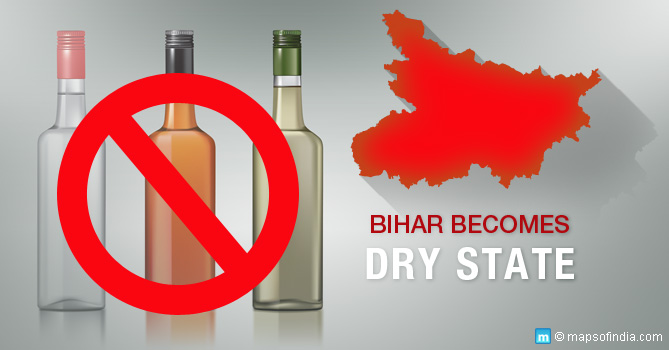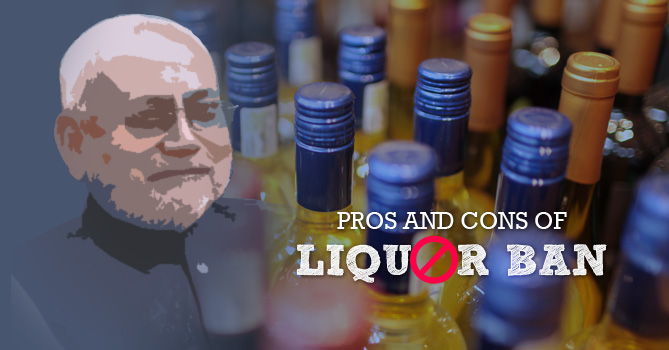On 5 April, Bihar became the fourth state in India to completely ban the sale and consumption of all forms of alcohol – including India Made Foreign Liquor (IMFL) – with immediate effect. Other states that have already banned alcohol completely are Gujarat, Nagaland, and Kerala. Nitish Kumar, the Chief Minister of Bihar, announced the decision following a cabinet meeting. The ruling means that from now on consuming alcohol in restaurants and bars will be deemed illegal. The state government had already banned, from 1 April, the consumption and sale of spiced and country liquor in the rural areas. However, it did permit foreign liquor to be sold in the cities and towns.
Popular response
The chief minister told the media that it was basically the overwhelming response of people – in places such as Patna and other towns – in favour of the earlier decision that prompted his cabinet to extend the ban to cities and towns and all kinds of alcoholic drinks. He stated that women and children were particularly supportive of the decision. In spite of the short duration separating the two bans, it was the magnitude of the response that convinced the state administration that they were on the right path. It showed them that the general opinion in the state was against alcohol. In fact, in his election campaign for the 2015 assembly elections Kumar had promised to start a popular movement against alcohol and make sure it was effectively banned.
What does this mean?
Now that the decision has been formally implemented, it means that apart from bars and restaurants – which have been mentioned already – other places such as hotels and clubs will not be allowed to sell liquor. The only exceptions to this rule are the army cantonment areas as they had their ways to regulate the consumption and sale of liquor.
Toddy and Neera
Toddy is a drink extracted from palm trees after sunrise because then it gets fermented and becomes alcoholic in nature. In recent times, this drink has been at the centre of controversy even as Lalu Prasad, the chief of Rashtriya Janata Dal, has stepped in to stop it from being banned. He has said that the main reason for his intervention is the fact that there are a lot of people who earn by collecting and selling toddy. So, any ban can have a debilitating impact on their livelihoods. However, it seems that the state cabinet has chosen to disagree with him with a strict imposition of the 1991 guidelines whereby toddy consumption is not allowed at all. However, these guidelines do allow the consumption of neera, a drink that has the same source as toddy but is taken before sunrise and does not have any alcoholic properties. The 1991 guidelines, however, do not allow the sale or consumption of neera within a 50 metre span of hospitals, places of worship, and educational institutions. This distance, though, is meant only for towns and cities. In the rural areas it goes up to 100 metres.
What will happen to the alcohol makers in Bihar?
Nitish Kumar has stated that the alcohol companies will be allowed to manufacture their products. However, they would not be able to sell it within Bihar. Apart from that, they will need to follow several rules pertaining to issues like digital locks and GPS systems for monitoring the whereabouts of vehicles that are transporting their products to other parts of the country for sale.
The state of residual IMFL
Bihar State Beverages Corporation Limited (BSBCL) already has around 36,000 litres of IMFL. Previously, the organization would supply its IMFL to some designated outlets in the various cities and towns, and that too under the strict supervision of the state. As per the Bihar CM, the state excise department would be coming up with a plan to disburse the same. However, he made his preferences quite clear in saying that it should be destroyed as it was not worth being stored in archives.
Applause for the decision
Sushil Kumar Modi, a BJP leader and erstwhile Deputy Chief Minister of Bihar, welcomed the decision. However, he reasoned that it was only due to pressure exerted by the opposition for completely prohibiting liquor in the state that such a ban happened.
Rounding up
This decision is praiseworthy on several counts. Apart from the obvious social impact thought to be resulting from the ban of liquor, this decision also shows that Nitish Kumar is one politician who always follows up on his promises. However, this decision has its financial implications as well. The state government could be losing out somewhere between INR 3700-4000 crore of excise tax, an amount that may have come in handy for several developmental projects. As far as the alcohol manufacturers are concerned one thing is for sure. The smaller and medium ones will now surely go out of existence or they will have to operate in a clandestine manner with the threat of state action looming large. The bigger companies might still find other avenues like acting as suppliers for industries such as cosmetics and pharmaceuticals that need alcohol or shifting base to other states. Definitely, export is not going to be as lucrative. The people who earn their livelihood from this industry will now face the biggest problem. Pay cuts at best, and labour rationalization at worst, can’t be ruled out. It remains to be seen how Nitish Kumar addresses their concern and how he makes sure that they keep earning the same way that they did before. It is also interesting that the state government has chosen to keep the army cantonments out of the ban’s purview. Now, there is a distinct possibility that without proper monitoring these locations could become alcohol havens for common people.






